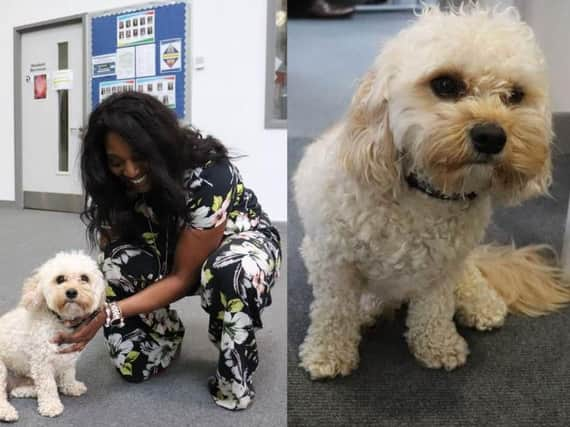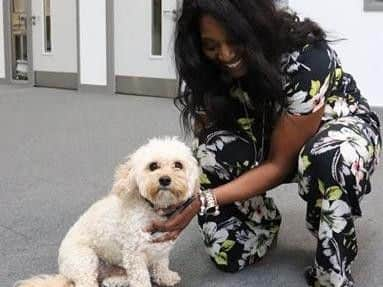Big-hearted pup Biscuit joins Fulwood school as classroom therapy dog


There were smiles all around the Fulwood Academy campus this week when a two-year-old Cavapoo began his new life as the school's therapy dog.
The caring canine - a Poodle and Cavalier King Charles Spaniel cross - belongs to Helen Goacher, the assistant principal for inclusion at The Academy.
Advertisement
Hide AdAdvertisement
Hide AdShe said Biscuit, who will take up residence at the school on a daily basis, will provide a wealth of educational and emotional benefits to pupils.


"Findings of research into mental health have shown that a therapy dog is beneficial to students", said Miss Goacher.
"Biscuit loves to be stroked and he has a very calm temperament, so is perfect for the role.
"He has been very well received by both staff and students, bringing smiles to lots of faces."
Advertisement
Hide AdAdvertisement
Hide AdBiscuit spent his first day at the Academy on June 19, and the pup has since embarked on a training programme for therapy dogs.


Ms Goacher, a trained Mental Health First Aider, said Biscuit will help increase students' understanding of responsibility and develop empathy and nurturing skills.
She said the pup has been specially chosen due to its calm temperament and he is known to be good with children prior to coming to the Academy.
She said: "There are a whole host of studies that have been conducted that show stroking or sitting or exercising with a dog can elevate levels of serotonin and dopamine, which help calm and relax people.
Advertisement
Hide AdAdvertisement
Hide Ad"But it’s more than that too. Pets can act as a way of breaking the ice and help students discuss their anxieties, plus they can also help to remove barriers and create mutual talking points.


"At Fulwood one of our priorities is to contribute positively to our students’ well-being and looking after their mental health.
"In addition to these benefits, students take great enjoyment from interaction with Biscuit.
"He will bring much joy and help to the students and he is happy to provide plenty of hugs. Students who struggle with social interaction can find a reassuring friend in Biscuit."
Advertisement
Hide AdAdvertisement
Hide AdFulwood Academy pupil Abbi is one of the many students who has made quick friends with the lovable pup.
She said: “Research has shown that dogs can read the side of a human’s face that reveals emotion, so that means Biscuit will be able to help pupils who are struggling with being upset or angry.
"The whole Academy is benefiting from Biscuit. You just can’t help but smile when you see him."
But the school admits that there is an element of risk in bringing a dog into a school environment.
Advertisement
Hide AdAdvertisement
Hide AdThe Academy has published its therapy dog policy on the school website, where it acknowledges the risks involved.
The policy states: "Yes, there is a risk, though there are a variety of accidents which can happen within the school environment which far exceed the number of injuries or incidents caused by a dog.
"Therefore, it is just another risk that needs to be managed. A thorough risk assessment has been carried out and is retained on the academy records."
Research has shown that dogs working and helping in the school environment can lead to a wide-range of positive outcomes.
Advertisement
Hide AdAdvertisement
Hide AdThe dogs have been credited with improving academic achievement, literacy skills, social skills and self-esteem, as well as encouraging respect for the welfare of animals.
Academy sponsor Sir Charles Dunstone suggested the idea after learning how pets can help people manage long-term mental health problems and reduce stress.
How do therapy dogs work?
In some schools, dogs are making a difference in the behaviour of pupils.
Research shows that students can identify with animals, and through empathy for the dog, they can better understand how classmates might feel.
Advertisement
Hide AdAdvertisement
Hide AdIt found that violent behaviour declined by 55% at schools with a resident therapy dog.
Students' behaviour improved toward teachers, and students also showed more confidence and responsibility. Additionally, parents reported that students seemed more interested in school as a result of having a dog at school.
The dogs are also used to encourage struggling readers to practise reading aloud.
Miss Goacher said: "Dogs are amazing listeners and we find it can be less stressful for some children to read aloud to a dog than to the class.
Advertisement
Hide AdAdvertisement
Hide Ad"After all, a dog won't judge or make fun of you. Instead, they provide students with a sense of comfort and love.
"Dogs like Biscuit give unconditional acceptance, as they are non-judgemental, which is crucial to struggling readers."
With a dog in school, students have the opportunity to learn how to care for the animal.
Researchers report that classroom dogs encourage children to learn about responsibility, caring, and sharing when helping each other take care of a dog.
Therapy dogs can also work with students on a one-one basis to help those students who have been bullied, abused, or are going through upsetting and difficult times.